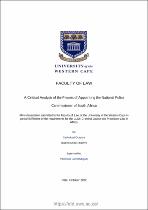| dc.contributor.advisor | Mujuzi, Jamil | |
| dc.contributor.author | Gcayiya, Siphokazi | |
| dc.date.accessioned | 2022-11-02T07:33:02Z | |
| dc.date.available | 2022-11-02T07:33:02Z | |
| dc.date.issued | 2022 | |
| dc.identifier.uri | http://hdl.handle.net/11394/9399 | |
| dc.description | Magister Legum - LLM | en_US |
| dc.description.abstract | The aim of this study is to critically dissect the current mechanism of appointing the NPC, and in return to propose a set of recommendations toward amendment of that mechanism. South Africa is recognized as a country with one of the highest crime rates in the world. Whilst scholars have attributed these prominent levels of crime to several contextual determinants, the country’s policing services have been singled out as being largely ineffective in curbing criminality. A key factor highlighted as a determinant of persistently poor performance of the SAPS, is a lack of effective senior leadership to assert managerial control. In particular, the role of national police commissioner (NPC), has been at the receiving end of significant criticism, as successive appointees to the position have been largely ineffectual in their leadership of the institution. As a contributing factor, the lack of an effective mechanism of recruitment and appointment has been cited as being a key reason why the SAPS has seen persistently poor performance from those individuals who have been selected for the role of NPC. | en_US |
| dc.language.iso | en | en_US |
| dc.publisher | University of the Western Cape | en_US |
| dc.subject | Employment | en_US |
| dc.subject | Criminality | en_US |
| dc.subject | South African Police Service (SAPS) | en_US |
| dc.subject | National Police Commissioner (NPC) | en_US |
| dc.subject | Legislation | en_US |
| dc.title | A critical analysis of the process of appointing the national police commissioner of South Africa | en_US |
| dc.rights.holder | University of the Western Cape | en_US |

